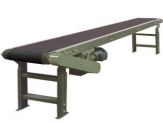 The Mission: Reduce emissions of cement dust and other “fugitive emissions” at the Grupo Cementos de Chihuahua cement plant in Rapid City, South Dakota.
The Mission: Reduce emissions of cement dust and other “fugitive emissions” at the Grupo Cementos de Chihuahua cement plant in Rapid City, South Dakota.
The Solution: An temporary shutdown of the company’s cement processing facility to upgrade its bulk material handling conveyors from top to bottom.
Executives at the GCC Dakotah plant recognized that they had a growing problem. An extensive review of its four conveyor systems to to handle raw materials revealed that significant upgrades were required to reduce the amount of cement dust that was being released into the atmosphere and to cut down on the amount of spillage.
The company further determined that too many man hours were being spent on maintaining and repairing its aging conveyor system and that the buildup of debris within the fast-moving system was potentially putting maintenance workers at risk, increasing their chances of accident of injury.
For help, GCC Dakotah turned to Martin Engineering, a Neponset, Illinois, consulting firm specializing in conveyor belt cleaners and industrial vibrators.
Complete Upgrade Required
Dan Marshall, the Martin engineer assigned to the project, quickly assessed what GCC Dakotah had to do.
“Virtually any time bulk material is moved, especially in large quantities or at high speeds, the potential exists to create and release dust,” Marshall said. “Dust accumulation affects both safety and productivity, so it’s really more than just a housekeeping issue. Complicating the situation is the fact that bulk handling systems frequently must accommodate changing weather and material conditions, making dust management an even bigger challenge.”
Still, Marshall believed he had a solution: Completely rebuild the six transfer points on the plants four conveyors so that the impact of the cement and other products was substantially reduced, along with sealing the conveyor system so that dust could not be easily released, effectively creating a closed system.
Working Overtime to Solve the Problem
Plans were drawn up and work on the product was scheduled for March. The downside was that the operation would require the facility to cease production for nearly two weeks. Still, GCC Dakotah executives determined there were no other viable options.
Work crews from GCC Dakotah, supervised by Martin Engineering consultants and aided by a mechanical contracting group, went to work on the extensive installation. To minimize lost production, 12-hour shifts were scheduled.
The existing belts were disassembled and three new idlers were installed, along with toughing roll assemblies, impact cradles equipped with rugged impact bars, and new slider cradles designed to eliminate sagging. Then each transfer point were fitted with apron seal skirting, along with a tracker that continually provides precision adjustment for the return side to reduce damage, prevent spillage and extend the life of the belts.
Finally, two cleaners were installed on each belt, allowing belts to be cleaned immediately without any break-in period. The cleaners also maintain consistent tension on the belts without frequent adjustment.
Mission Accomplished
Ultimately, the project was completed in just 11 days. GCC Maintenance Manager Ralph Denoski said it was money well spent.
“The production team responsible for that area has had nothing but positive feedback about the upgrades,” Denoski said. “We’re not losing product to spillage and dust, so that material can be sold instead of cleaned up off the floor. The manpower formerly spent on cleanup can now be directed to core business activities.”
